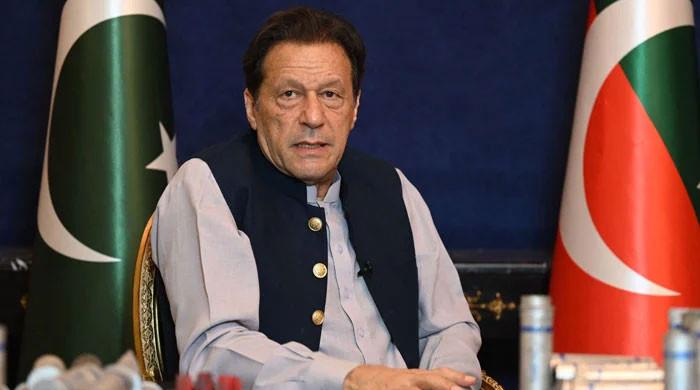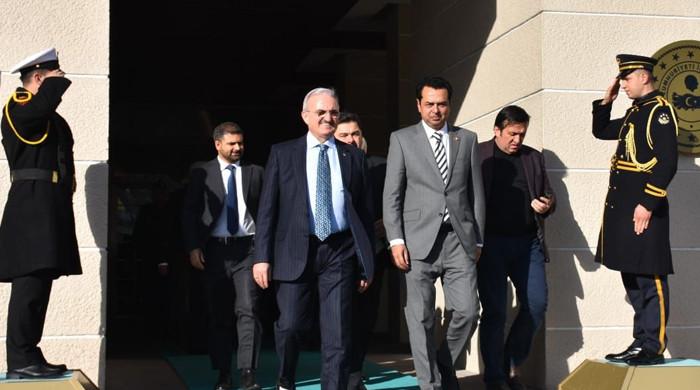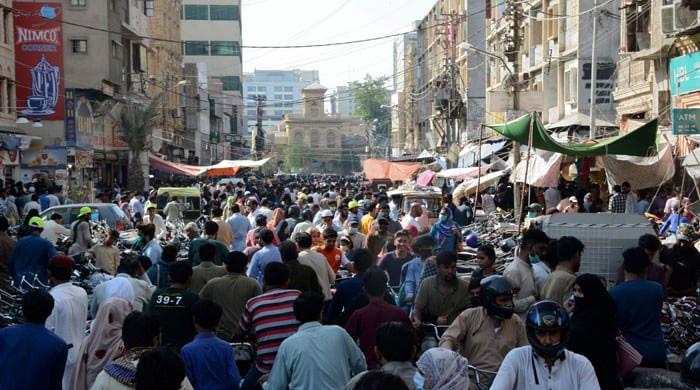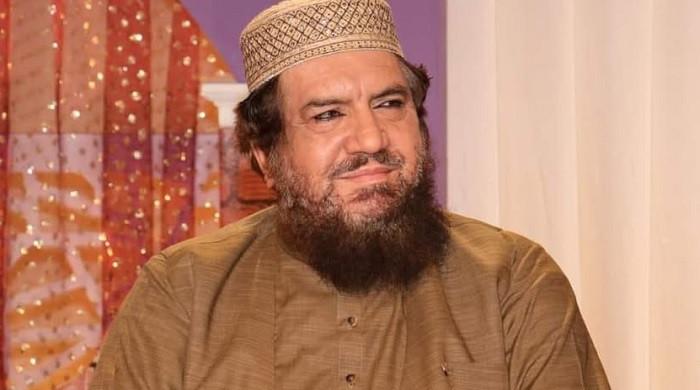IHC judges' allegations: Ex-CJP Tassaduq Hussain Jillani to head probe commission
Cabinet approves constitution of inquiry commission to probe allegations of spy agencies' meddling in judicial affairs
March 30, 2024
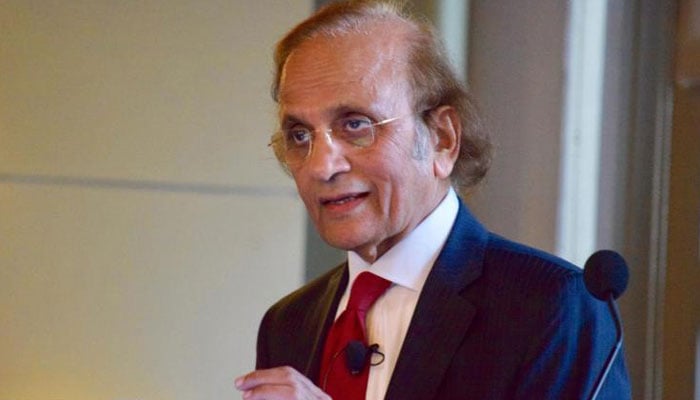
- Inquiry commission would submit its report in 60 days, say sources.
- Cabinet terms executive's interference allegations inappropriate.
- PM reaffirms resolve for the independence of the judiciary.
The federal cabinet approved the constitution of an inquiry commission over allegations of the Islamabad High Court (IHC) judges and appointed former chief justice of Pakistan Justice (retired) Tassaduq Hussain Jillani as its head, a declaration issued on Saturday stated.
The commission — solely headed by the former CJP Jillani — would hold inquiry into the allegations levelled by the judges in a letter. Subsequently, the cabinet members also gave go-ahead to the terms of reference (ToRs) of the commission.
The inquiry commission would submit its report in 60 days, Geo News reported citing sources.
They said officials of bureaucracy and other irrelevant persons were requested to leave the room when the matter of the letter came under discussion in the cabinet meeting. The cabinet members gave the right to appoint the commission’s head to the PM expressing full support for whoever he appoints.
According to an official statement issued following the huddle, the federal cabinet also denied the allegation of executive's interference in judicial matters as levelled by the judges in the letter and termed them “inappropriate”.
The cabinet members were of the unanimous opinion that the Constitution enunciates the principle of separation of powers among the state institutions.
On the occasion, the PM reaffirmed his resolve for the independence of the judiciary and the principle of constitutional separation of powers.
He took the cabinet members into confidence about his consultation and meeting with the CJP after the letter.
The cabinet fully endorsed and supported the PM’s decisions and actions taken so far in this regard.
The IHC judges — Justice Mohsin Akhtar Kiyani, Justice Tariq Mehmood Jahangiri, Justice Babar Sattar, Justice Sardar Ejaz Ishaq Khan, Justice Arbab Muhammad Tahir, and Justice Saman Fafat Imtiaz — on March 26 sent a letter to the Supreme Judicial Council (SJC), urging it to convene a judicial convention over the alleged interference of intelligence agencies in judicial affairs.
In response to the letter, Chief Justice of Pakistan (CJP) Qazi Faez Isa had on March 28 said that meddling by the executive in the affairs and "judicial workings of Judges will not be tolerated" come what may.
He had said this during a meeting with Prime Minister Shehbaz Sharif at the Supreme Court in Islamabad. The chief justice and PM had agreed in the meeting to form an inquiry commission.
The letter came days after the top court declared the removal of former IHC Justice Shaukat Aziz Siddiqui illegal, directing that he may now be considered as a retired judge.
“Considering the gravity of the allegations levelled in the said letter, the CJP called a meeting on the same day with the Chief Justice and all the Judges of the Islamabad High Court after Iftar at 8 pm at the Chief Justice’s residence,” the top court said in the statement on March 28.
It said the concerns of all the judges were heard individually in a meeting that lasted for over two and a half hours.
On March 27, the CJP met Attorney General Mansoor Usman Awan and Law Minister Azam Nazeer Tarar and thereafter the CJP along with Senior Puisne Judge Mansoor Ali Shah met with the president of the Supreme Court Bar Association and the senior most member of the Pakistan Bar Council present in Islamabad, as per the SC statement.
The full court meeting of all the judges of the Supreme Court was called under the chairmanship of CJP at 4pm the same day and the huddle deliberated over the issues raised in the letter sent by the six judges of the Islamabad High Court.
“A consensus was developed amongst the majority of the members of the Full Court that in view of the gravity of the situation, the CJP may hold a meeting with the Prime Minister of Pakistan on the issues raised in the said letter and the meeting was adjourned.”
Subsequently, PM Shehbaz accompanied by the law minister and the AGP met with the CJP, senior puisne judge and registrar of the Supreme Court at the apex court at 2pm on March 28.
The meeting lasted for about an hour and a half wherein the CJP “clearly stated that interference by the Executive in the affairs and judicial workings of Judges will not be tolerated and under no circumstances can independence of the judiciary be allowed to be compromised”.
During the meeting a proposal was made to constitute an inquiry commission under the Pakistan Commissions of Inquiry Act, 2017 which should be headed by a retired judge of “impeccable integrity” to inquire into the matter, as per the statement.
The statement further said that PM Shehbaz undertook that a meeting of the federal cabinet will be called to seek their approval for the constitution of the said commission.
It said the premier fully endorsed the views expressed by CJP Isa and Senior Puisne Judge Shah.
Former CJ Tassaduq Jillani
After serving for more than 10 years as a Supreme Court judge, including a brief tenure as the CJP, Jillani retired as the top judge on July 10, 2014.
74-year-old Justice (retired) Jillani was born on July 6, 1949. He did his LLB from the University of Punjab and started practicing law at the Multan district courts in 1974.
Jillani became an apex court lawyer in 1983. He was sworn in as the Lahore High Court judge in August 1994. And after ten years was elevated as a SC judge in July 2004. He served as the top court judge till imposition of the state of emergency in November 2007. He then again took oath as the SC judge in 2008. He was appointed as the chief justice of Pakistan in 2013.
In August 2023, the ex-CJP received the 2023 American Bar Association (ABA) International Human Rights Award, in recognition of "his courageous judgments against political impunity in a time of crisis and for defending judicial independence" in Pakistan.
He was also awarded the 2020 J Clifford Wallace Award by the J Reuben Clark Law Society (JRCLS) to honour his "extraordinary career as a judge and a jurist".
Known to be a "balanced" judge, Justice Jillani delivered key rulings of great significance on domestic and international concerns.
These include his judgments enforcing fundamental rights, gender equality, declaring the right to education a fundamental right, holding that in an age of globalised inter-dependence, dual nationality should be permitted, laying down guidelines for qualitative improvement in legal and medical education, both in the Lahore High Court and the apex court.
However, perhaps, the two rulings that brought him to the foreground were the right of an adult woman to marry a person of her choice in Islam and his landmark ruling on minority rights in 2014, after he took suo moto notice of the matter of the protection of minorities, following a blast in a church in Peshawar that claimed 81 lives.




